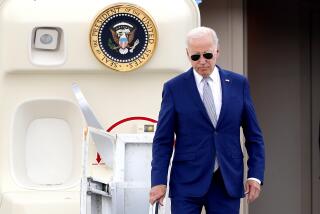Clinton in Asia: All Form, No Substance : His Korea announcement was ill-prepared, and he didn’t address central security issues.
- Share via
Just when President Clinton appeared to have turned the corner on foreign policy, his Asia trip showed him reverting to norm: an overload of hype, too much improvisation, too little strategy. The result is that once again, America’s Asian allies are left asking, “When are the Americans going to get serious about 21st century Asia?”
To start in Korea: Despite the fact that the Koreans are America’s most exposed partner in Asia, Clinton’s brief stopover in Korea was added as a late afterthought to assuage Korean dismay at being omitted from Clinton’s original itinerary at a time of territorial tension between themselves and the Japanese.
This last-minute arrangement brought with it the need to add some “big picture” policy ingredient to Clinton’s meeting with President Kim Young Sam. Otherwise, the meeting might have appeared as merely ceremonial or even, given the lush surroundings of the Cheju Island resort, as foreign junketing. And so the idea of four-power talks about the future of the Korean peninsula was born.
In itself, the notion that the U.S., China and North and South Korea should thrash out their differences among themselves is not a bad one. It has been under discussion between Washington and Seoul since it first surfaced in July 1995, when Kim visited Washington for the dedication of the Korean War Memorial.
The proposal, however, contains one massive implication for North Asia’s future: It acknowledges China as a diplomatic partner for the U.S. Some may question whether it is sensible to invoke China’s help over Korea at a time of so much U.S.-China tension on other issues. Beyond dispute, however, is the fact that this proposal confers tremendous diplomatic legitimacy on China in an area of key importance to the U.S. The proposal should, therefore, have been meticulously prepared.
Transparently, this is not the case. Instead, as the Korean diplomatic commentator Jeong Woo Kil has remarked, the proposal seems to have been “thrown into the air like a ball.” Basic staff work--like ensuring that a positive Chinese response would be forthcoming--was sacrificed to Clinton’s need to make a short-term splash. The result is that, to keep the proposal afloat, the U.S. now has to go cap-in-hand to China to secure its acquiescence. Indeed, on Friday China rebuffed the Clinton administration’s call for talks on the future of the Korean Peninsula by suggesting that Seoul and Pyongyang will have to work out their own differences before outside powers intervene.
A similar willingness to place expediency before long-term requirements was on display in Clinton’s discussions in Japan. His speech to the Diet was oratorically effective but missed the crucial point about Asian security. The central issue here is not whether the U.S. should maintain a strong presence in Asia, but how this should be configured and what its mission should be. With the exception of a brief comment that the U.S. wanted to prevent an arms race in Asia, the silence on these questions was deafening.
Preventing an arms race is a laudable aim. But the race is already well advanced. Asia has replaced the Middle East as the world’s most attractive arms bazaar. Japan is responding to this environment of increased threat. Japanese naval officers talk openly about the new missions outlined in their National Defense Planning Outline and look forward to the day when Japanese naval vessels will patrol the Indian Ocean, offering protection to Japanese tankers bringing oil from Iran. They ask rhetorically whether Japan can rely on the U.S. 7th Fleet to perform this task.
Unfortunately, the American approach to these developments is to play catch-up. Though the trip was heralded as introducing unique security breakthroughs, Clinton did no more than reaffirm existing Cold War-era arrangements. Under these, all security matters radiate bilaterally back to the United States acting as the hub of a sort of Asian security wheel. Conspicuously absent is any multilateral system for the Asians to talk to one another.
This hub-and-spoke concept is obsolete. Today’s Asian problems are complex and interwoven, as the Korean proposal and the Spratly Islands dispute show. The old security models are no longer credible.
New Asian defense formats will be difficult to find, particularly as the Asians themselves tend to be intellectually cautious. This is where American leadership is desperately needed, to devise some form of interlocking system with defined, shared responsibilities, perhaps loosely modeled on NATO, that allows Asia’s post-Cold War security problems to be handled efficiently. Short of this, the Asians will go their own way. American influence will diminish, and the result will be chaos.
More to Read
Sign up for Essential California
The most important California stories and recommendations in your inbox every morning.
You may occasionally receive promotional content from the Los Angeles Times.













